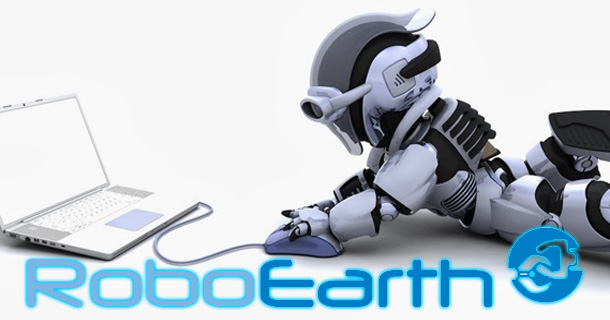Over the past year and a half alone, we have created robots with systems so sophisticated they think they’re human and robots with enough advanced motion capabilities to pirouette like ballerinas. But our mechanical would-be conquerors are still missing a key piece of their arsenal—their own network to share information instantaneously.

SCIENTISTS NO
Never mind—our scientists, once again, have that problem covered.
Thanks to a team of scientists from five of Europe’s major technical universities, robots have RoboEarth: a system described as “Wikipedia for robots” that took just about four years to develop. A team of five bots connected by the system was tested out in a mock hospital room in the Netherlands, where they completed a series of tasks in order to demonstrate RoboEarth capabilities.
The capabilities of the system were tested by bots Avi and Amigo among others, who used RoboEarth to bring a glass of milk to a mock patient. First, Avi—a small little bot shaped a bit like a trash bin—scanned the hospital room in order to create a map of its physical layout. Then, using the map through RoboEarth, the humanoid Amigo was able to locate the carton of milk on a table, grip it with its pincer, and carry it over to the bed.
Then Amigo promptly dropped the glass on the floor, having completed his assigned task to the letter. Clearly RoboEarth still has its bugs to work out (which makes me feel better about the fate of the free world, I have to say), but expectations for the system are still high among the technological community.
According to RoboEarth project leader Rene van de Molengraft on BBC, RoboEarth’s eventual goal is to be a network where both humans and robots can upload information to the system’s cloud database, allowing it to be a “common brain” for robots.

Because what this world really, really needs is robots WITH A HIVE MIND.
“At its core RoboEarth is a world wide web for robots: a giant network and database repository where robots can share information and learn from each other,” said van de Molengraft.
I’m going to be honest with you—that sounds horrific. It really, really does. And I’m not the only one who thinks so.
According to BBC, author James Barrat also has seriously concerns about the power this will give to robotkind.
“In the short term, RoboEarth adds security by building in a single point of failure for all participating robots,” said Barrat. “In the longer term, watch out when any of the nodes can evolve or otherwise improve their own software. The consequences of sharing that capability with the central 'mind' should be explored before it happens.”
So…we should make sure robots don’t have the technology or knowledge required to repair or improve themselves, is what you’re saying. Technology like this, in other words.
Engineers. Scientists. Innovators. Can we please stop handing robots exactly what they need to conquer humanity? Please? Channel your gifts into something we could really use—it’s 2014, how come we don’t have the ability to teleport? Or force-fields?
Somebody stop sprucing up the robots for victory over mankind and get on that.
Source BBC
Advertisement





